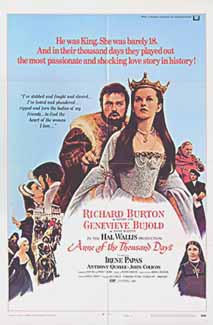
ANNE OF THE THOUSAND DAYS
UK, 1969, 137 minutes, Colour.
Richard Burton, Genevieve Bujold, Irene Papas, Anthony Quayle, John Colicos, Michael Hordern, Gary Bond.
Directed by Charles Jarrott.
Anne of the Thousand Days is another of producer Hal Wallis's contributions to the cinema of British history, like his earlier Becket and his subsequent Mary Queen of Scots and Bequest to the Nation. It is based on Maxwell Anderson's play.
The film is interesting and entertaining, although not one of the historical greats (despite so many Oscar nominations 1n 1969). Richard Burton is as expected in the role of Henry VIII. Genevieve Bujold, however, is excellent as Anne, a delicate looking girl growing in the love of power until she is destroyed by her ambitions. She offers the audience insights into the complexity of good and evil in Anne Boleyn.
Television director Charles Jarrott went on to make Mary Queen of Scots.
1. Was the film principally as a historical spectacle or the tragedy of Anne Boleyn?
2. Was the English political and religious situation well explained? What built up the picture of Tudor England?
3. How was Henry VIII presented at first, sympathetically? What were his driving ambitions? How important for him was it to have a son, how important for England?
4. Why had Henry VIII and Catherine grown so far apart? what kind of woman was Catherine? Was she presented as sympathetic? How was she humiliated by Henry in his conduct towards Anne?
5. What was the position of the Boleyns in England - Mary, Anne, the parents? Haw did Mary's position affect them?
6. How was Anne presented at first? An attractive girl? Was she genuinely in love with Percy? How were the Boleyns changed and what pressures did they put on Anne? Did she have the will to resist them? Did she really have ambitions? How did the idea of power fascinate her?
7. Why did Anne keep Henry at bay for so long? How shrewd was she? Did she love him? Did she grow to love him? Did she love herself and power more or less ?
8. What role did Wolsey ploy? What kind of man was he? How shrewd? How ambitious? How religious? Was his humiliation and fall from power merited?
9. What kind of man was Cromwell? Was he in any way admirable? What had he learned from Wolsey? What influence did he have on Henry? Could Henry see through him?
10. What had Anne achieved by the time she let Henry marry and drown her? Did she believe in the divorce? Did she have any sympathy for Catherine? Did hostile public opinion affect her? Was she confident in herself and her capacity to have a son?
11. What effect did the birth of Elizabeth and of her stillborn child have on her? Did she lose confidence in herself? How did she change? How petulant did she become? The court scene paralleling the previous scene with Catherine?
12. Did Henry consent to the trials? Did he believe in the guilt of Anne and of the others? How much was political? How much the desire to have a son? How much the persuasion of Cromwell?
13. Did Anne conduct herself well during the trials? How did she compare with Catherine at her trial? Did the film highlight this?
14. What was the impact of the trial and torture of Smeaton?
15. Anne had allowed people like More and Fisher to die for her. What was the impact of people forced to die because of her?
16. How important was her prison soliloquy about the 1000 days? What light did it shed on Anne? On her career? On the value and values of her life?
17. How could Henry reject Anne so quickly when he had loved her so much?
18. How moving was Anne's death? Why?
19. What was your impression of Henry VIII as he listened for the signal of Anne's death and rode off to see Jane Seymour?
20. What was the significance of the epilogue about Elisabeth? Did it fit well into the film? Did it glorify Elizabeth too much? Did it appropriately conclude this look at England's History?